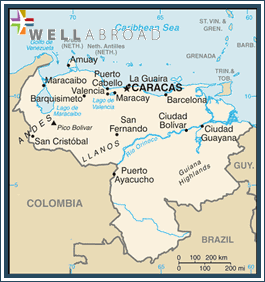|
MOST RECENT ALERTS
There's no recent alert.
|

|
|||||||||||||||
| COUNTRY OVERVIEW | ||||||||||||||||
|---|---|---|---|---|---|---|---|---|---|---|---|---|---|---|---|---|
|
| COUNTRY GENERAL INFORMATION | |||||||
|---|---|---|---|---|---|---|---|
| Language: |
Spanish (official), Numerous indigenous dialects |
||||||
| Currency: | Bolivar (VEB) | ||||||
| Predominant Religions: |
Nominally Roman Catholic 96%, Protestant 2%, Other 2% |
||||||
| National Holidays: | Independence Day, 5 July (1811) | ||||||
| Economic Status: |
Venezuela remains highly dependent on oil revenues, which account for roughly 90% of export earnings, more than 50% of the federal budget revenues, and around 30% of GDP. Emboldened by his December 2006 reelection, President Hugo CHAVEZ , in 2007, nationalized firms in the petroleum, communications, and electricity sectors, which reduced foreign influence in the economy. Although voters in December 2007 rejected CHAVEZ's proposed constitutional changes, CHAVEZ still has significant control of the economy and has indicated he intends to continue to consolidate and centralize authority over the economy by implementing "21st Century Socialism." |
||||||
| Security: |
National Armed Forces (Fuerza Armada Nacionale, FAN): Ground Forces or Army (Fuerzas Terrestres or Ejercito), Naval Forces (Fuerzas Navales or Armada; includes Marines, Coast Guard), Air Force (Fuerzas Aereas or Aviacion), Armed Forces of Cooperation or National Guard (Fuerzas Armadas de Cooperacion or Guardia Nacional) |
||||||
| US Presence: |
U.S. Embassy in Caracas
F St. and Suapure St. Urb . Colinas de Valle Arriba Caracas, Venezuela 1080 Phone: +58 (212) 975–6411 |
||||||
| Document Requirements: |
A valid passport and a visa or tourist card are required. Tourist cards are issued on flights from the US to Venezuela for persons staying less than ninety days. Persons traveling for reasons other than tourism, however, should consult the Venezuelan Embassy or nearest Venezuelan consulate regarding possible visa requirements for their specific purpose of travel. Venezuelan immigration authorities may require that US passports have at least six months validity remaining from the date of arrival in Venezuela. Some US citizens have been turned back to the US because their passports were to expire in less than six months. Passports should also be in good condition, as some US citizens have been delayed or detained overnight for having otherwise valid passports in poor condition. |
||||||
| Major Airports: |
Airports: 44, Airports w/paved runways: 37
|
||||||
| Servicing Airlines: |
|
||||||
| Risks and Precautions: |
Violent crime in Venezuela is pervasive, both in the capital, Caracas, and in the interior. The country’s overall per capita murder rate is cited as one of the top five in the world. The Venezuelan National Counter Kidnapping Commission was created in 2006, and since then, official statistics have shown alarming increases in reported kidnappings throughout the country. In fact, kidnappings in 2009 have increased anywhere from 40-60 percent from the previous year. Surveys show that the overwhelming majority of kidnappings and other major crimes are not reported to the police. Armed robberies take place throughout the city, including areas generally presumed safe and frequented by tourists. Well-armed criminal gangs operate widely, often setting up fake police checkpoints. Only a very small percentage of crimes result in trials and convictions. |
||||||
| Mortality Statistics: |
Infant MR total: 22.02 deaths/1,000 live births |
||||||
| Immunization Indicators: |
Required: None
|
||||||
| Infectious Disease Concerns: |
Malaria risk area in Venezuela: Risk exists in rural areas of the following states: Apure, Amazonas, Barinas, Bolivar, Sucre, Tachira, and Delta Amacuro. Risk in Angel Falls. |
||||||
| Overall Quality of Medical Services: |
Medical care at private hospitals and clinics in Caracas and other major cities is generally good. Public hospitals and clinics generally provide a lower level of care, and basic supplies at public facilities may be in short supply or unavailable. Cash payment is usually required in advance of the provision of medical services at private facilities, although some facilities will accept credit cards. Patients who cannot provide advance payment may be referred to a public hospital for treatment. Private companies that require the patient to be a subscriber to the service or provide cash payment in advance generally provide the most effective ambulance services. Public ambulance service is unreliable. US citizens should be aware that due to the currency restrictions in effect in Venezuela they might find it difficult to receive wire transfers from abroad, whether through a bank or Western Union. Such wire transfers cannot be used reliably as a source of emergency funds. US citizens traveling to Venezuela may also find it difficult to obtain certain prescription drugs, particularly name brands, and should ensure that they have sufficient quantities of all medications for the duration of their stay |
||||||
| Providers in Network: |
|
||||||
| Recent Medical Threats/ Concerns/Warnings: |
Please refer to the “Infectious Disease Concerns” section.
|
||||||
| Communications Info: |
Calling Code: +58 |
||||||






